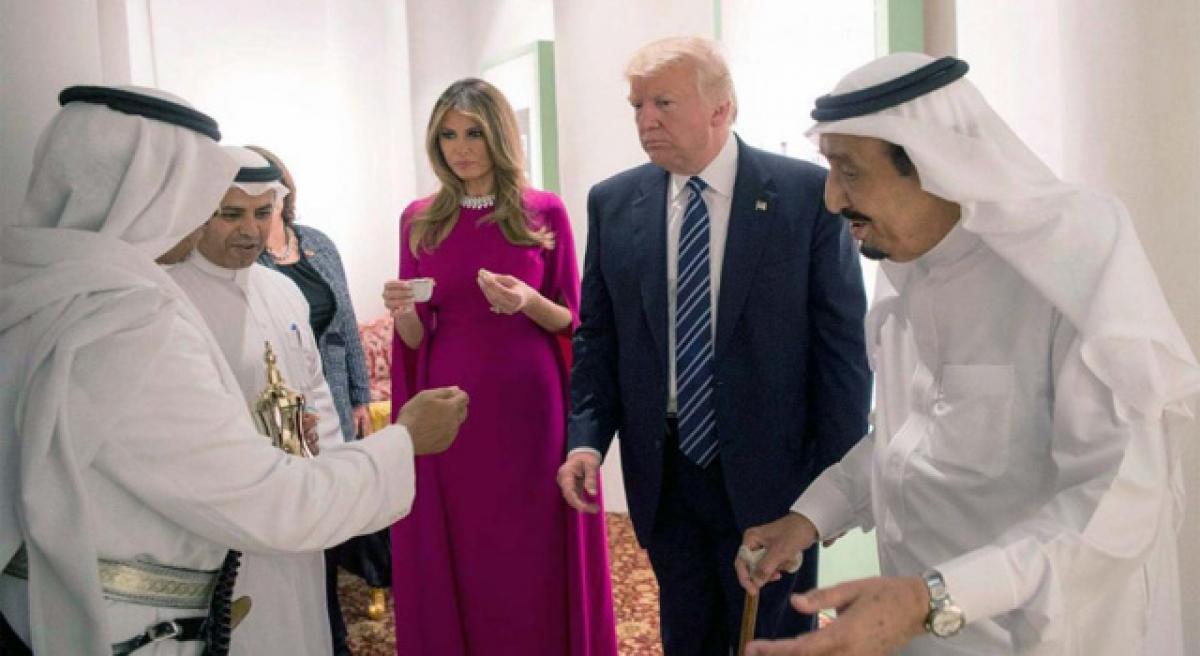Live
- New TTD Trust Board to meet in Tirumala today
- Drone survey held for laying smart roads
- MyVoice: Views of our readers 18th November 2024
- It’s time to defeat betrayers: Revanth in Maharashtra
- Committees formed, assigned tasks
- Let law and order be in sole domain of union!
- Group-III exams off to a smooth start
- KTR invited as guest of honour at TiEcon Kerala 2024
- KTR gets his freedom in a deal done in Delhi: Bandi Sanjay
- Hyderabad Ready to Host FIFA Friendly Football Match Between India and Malaysia
Just In

Five months after assuming office as the first black President of the US, Barack Hussein Obama delivered a historic speech at Cairo University on June 4, 2009 in which he extended an olive branch to the ‘evil state’ Iran and offered to bridge the gulf between the Islamic and the Western civilisations.
Five months after assuming office as the first black President of the US, Barack Hussein Obama delivered a historic speech at Cairo University on June 4, 2009 in which he extended an olive branch to the ‘evil state’ Iran and offered to bridge the gulf between the Islamic and the Western civilisations. Obama’s call for dialogue had given the much-needed relief to the besmirched Muslim society post-September 11, 2001 attacks on American symbols of power.
Almost eight years later, another US President, Donald Trump, has followed in the footsteps of his predecessor to deliver a message to the Arab and Islamic world. This time the maverick Republican President has chosen Saudi Arabia to convey his message of not peace but to play an anti-Iran trump card. Trump’s address to 55 heads of state and government at the Arab-Islamic-US summit in Riyadh on Sunday was notable for ditching Obama’s Mideast policies, including the one on Iran that ended decades of hostilities between Washington and Teheran and drawing battle lines between a predominantly Sunni Arabs and theocratic Shiite Iran.
Trump seems to have exploited oil-rich Sheikhdoms’ fears about Iran, its ‘peaceful’ nuclear programme, missile development and its perceived threats to Arab Gulf States and above all the Iranian overt and covert attempts to check what the Ayatollahs call Saudi hegemony in the region. Despite a US-Iran nuclear agreement that facilitated normalisation of relations between the two sworn enemies in the last days of Obama’s presidency, Arab rulers are wary of Iran and feel let down by Obama.
Since the Iranian Revolution in 1979, the US has been at odds with Iran and every American president, except Obama, has tried to isolate Teheran, imposing sanctions. Now, Trump has turned the clock back, accusing the Iranian regime of funding, arming and training extremist groups that spread destruction and chaos across the region from Lebanon to Iraq to Yemen. “For decades, Iran has fueled the fires of sectarian conflict and terror. It is a government that speaks openly of mass murder, vowing the destruction of Israel, death to America, and ruin for many leaders and nations in this room.”
Trump’s accusations were music to the Arab and Muslim leaders’ ears. For, their common enemy is the Superpower’s too and they are all on the same wavelength as far as Iran is concerned. In a way, Trump has succeeded in reinforcing Arab allies’ trust and their common faith in the United States as the savior, notwithstanding his anti-Islamic rant and enhanced security measures against Muslims coming from some Mideast countries to the US.
If Arab press reports are any indication, Trump’s two-day visit to Saudi Arabia, the first foreign trip since he entered the White House, and his talks with the kingdom’s monarch Salman and other regional leaders was a resounding success as Trump has reassured them of American security and protection. The $400 billion US-Saudi defence deals are a reward for Trump’s effort to allay Arab fears.
While he was able to regain Arab leaders’ confidence in the US with relative ease, Trump has found the Israeli-Palestinian problem a hard nut to crack. True to the American policy of balancing ties between Arabs and Israelis, he flew to Israel from Riyadh to meet Israeli Prime Minister Benjamin Netanyahu and travelled by road to Palestinian territories to discuss peace with Palestinian President Mahmoud Abbas. Both the meetings were lack luster and lost in the run-of-the-mill rhetoric.
Earlier, Trump had said “there's a rare opportunity to bring security to the region, defeat terror and create harmony and peace.” How, he hasn’t explained. Nor did he have any solution in his pocket to spring a surprise. There is no change in the official positions of Israel and Palestinians as far as their core dispute –Israeli recognition of Palestine – is concerned. In any case, Trump appears to be least interested in resolving a dispute that is half century old although he had boasted of striking the ‘ultimate deal.’
Since the imbroglio has seen many presidents come and go, with many making tall claims and promises, Trump’s peace talk is a mere lip service to another Mideast peace initiative. If Trump is to be judged by his actions, not by his words, his first trip as the President of the most powerful nation to a volatile and conflict-ridden region shows there is nothing much for him to offer except selling military hardware.
On the other hand, Trump’s hard policy on Iran would drive a wedge between West and the Islamic Republic and worsen the situation in conflict zones like Syria and Iraq. It looks Trump is preparing himself for a head-on confrontation with Iran which has just re-elected moderate President Hassan Rouhani for a second term. If he puts Iran along with North Korea in the cross hairs, Washington will be back in the game of war Americans love to play.
By Madhusudhana Rao S

© 2024 Hyderabad Media House Limited/The Hans India. All rights reserved. Powered by hocalwire.com







